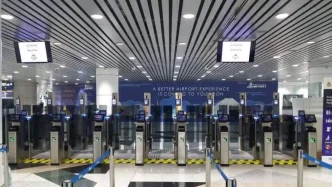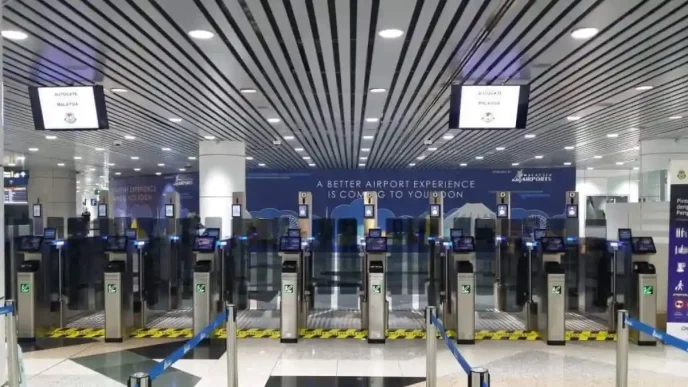In a dramatic case that has gripped Malaysia, Hafizul Harawi, a 38-year-old former travel agency manager, has been sentenced to an effective six years in prison following a violent incident at Kuala Lumpur International Airport (KLIA) Terminal 1 last April. Harawi pleaded guilty to seven charges, including possession of a firearm, bullets, and firecrackers without permits, in a Kelantan court on 25 February. The sentencing comes after he allegedly attempted to murder his estranged wife at the airport, instead severely injuring her bodyguard.
The incident, which unfolded on 14 April 2024, shocked the nation and raised concerns about security at one of South East Asia’s busiest transport hubs. Harawi’s case also highlights broader issues of domestic violence and illegal weapons possession in Malaysia, drawing public and legal scrutiny as he still faces additional charges related to the attempted murder.
A Violent Confrontation at KLIA
According to reports from Malaysian media, including the news agency Bernama, the confrontation at KLIA Terminal 1 occurred as Harawi’s wife, Farah Md Isa, who runs a travel agency, was at the airport to receive pilgrims returning from Mecca. Harawi allegedly fired two shots from an Austrian-made Glock 19 pistol in her direction. The bullets missed Farah but struck her bodyguard in the stomach, causing severe injuries. He is also accused of throwing a firecracker, which injured two bystanders.
The couple was reportedly in the midst of a contentious divorce at the time of the incident, though authorities have not officially confirmed a motive. Harawi fled the scene but was arrested two days later in Kota Bharu, Kelantan, some 400 kilometres from Kuala Lumpur.
Sentencing and Charges
On 25 February 2025, Harawi received a cumulative sentence of 14 years and six months in prison, along with six strokes of the cane, for the seven charges to which he pleaded guilty. The most severe penalty was six years’ imprisonment and six strokes for possessing the Glock 19 pistol. Additional sentences included three years each for possessing bullets and firecrackers without permits, six months for each of three counts of possessing identification cards that did not belong to him, and one year for driving a car with a fake licence plate.
However, the Kelantan court judge ordered the sentences to run concurrently from the date of his arrest on 15 April 2024, meaning Harawi will serve only six years in total. This decision has sparked debate among legal observers and the public, with some questioning whether the penalty adequately reflects the gravity of the crimes, particularly given the public nature of the attack and the injuries caused.
Harawi still faces two further charges at the Sepang Sessions Court, including attempted murder of his wife and voluntarily causing grievous harm to her bodyguard. These proceedings are expected to provide further insight into the events of 14 April and could result in additional penalties if he is convicted.
Public Safety and Legal Implications
The incident at KLIA has reignited discussions about security protocols at Malaysia’s airports. KLIA, a critical gateway for international travel and a hub for religious pilgrimages such as the Hajj, sees millions of passengers annually. The ease with which Harawi allegedly brought a firearm and explosives into a high-security area has prompted calls for stricter screening measures and enhanced surveillance.
Legal experts have also pointed to the case as a stark reminder of the dangers of illegal weapons in private hands. Possession of firearms without a permit is a serious offence under Malaysian law, carrying severe penalties under the Firearms (Increased Penalties) Act 1971. Harawi’s sentencing, including the corporal punishment of caning, reflects the judiciary’s intent to deter such crimes. However, the concurrent nature of the sentences has led some to argue that the punishment does not fully match the potential risk to public safety demonstrated by his actions.
Broader Context of Domestic Violence
While the court has not officially linked the attack to personal motives, the reported context of Harawi’s divorce from Farah Md Isa has drawn attention to the issue of domestic violence in Malaysia. Advocacy groups have noted that disputes during separations can sometimes escalate into violent confrontations, particularly when access to weapons is a factor. The injuries to Farah’s bodyguard and two members of the public underscore how such incidents can endanger not only the intended target but also innocent bystanders.
Malaysia has taken steps in recent years to address domestic violence through legislation like the Domestic Violence Act 1994, which provides for protection orders and penalties for offenders. However, activists argue that more needs to be done to ensure enforcement and to address cultural stigmas that may prevent victims from seeking help. This case, playing out in the public eye, may serve as a catalyst for further discussion on these issues.
Public Reaction and Ongoing Questions
Public sentiment, as reflected in local media and social platforms, has been a mix of outrage over the violence and concern about the sentencing. Many Malaysians have expressed shock that such an incident could occur in a secure location like KLIA, while others have questioned how Harawi obtained a firearm and whether there are gaps in the system for tracking illegal weapons.
As Harawi awaits trial on the remaining charges, attention will likely remain on the Sepang Sessions Court proceedings. The outcomes of those cases could provide clarity on his intent during the airport incident and whether additional penalties will be imposed. For now, the effective six-year sentence marks a significant, though contested, chapter in a case that has captured national attention.
This story falls into the category of a filler piece due to its focus on a specific criminal case without broader political or economic implications. It prioritises the key details of the incident, sentencing, and public safety concerns, while providing necessary context for an international audience unfamiliar with Malaysian legal or social norms.














